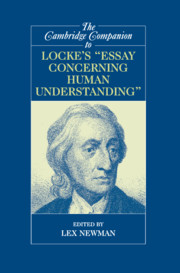Book contents
- Frontmatter
- Introduction
- 1 The Intellectual Setting and Aims of the Essay
- 2 Locke’s Polemic against Nativism
- 3 The Taxonomy of Ideas in Locke’s Essay
- 4 Locke’s Distinctions between Primary and Secondary Qualities
- 5 Power in Locke’s Essay
- 6 Locke on Substance
- 7 Locke on Ideas of Identity and Diversity
- 8 Locke on Ideas and Representation
- 9 Locke on Essences and Classification
- 10 Language, Meaning, and Mind in Locke’s Essay
- 11 Locke on Knowledge
- 12 Locke’s Ontology
- 13 The Moral Epistemology of Locke’s Essay
- 14 Locke on Judgment
- 15 Locke on Faith and Reason
- Bibliography
- Index of Names and Subjects
- Index of Passages Cited
14 - Locke on Judgment
Published online by Cambridge University Press: 28 July 2007
- Frontmatter
- Introduction
- 1 The Intellectual Setting and Aims of the Essay
- 2 Locke’s Polemic against Nativism
- 3 The Taxonomy of Ideas in Locke’s Essay
- 4 Locke’s Distinctions between Primary and Secondary Qualities
- 5 Power in Locke’s Essay
- 6 Locke on Substance
- 7 Locke on Ideas of Identity and Diversity
- 8 Locke on Ideas and Representation
- 9 Locke on Essences and Classification
- 10 Language, Meaning, and Mind in Locke’s Essay
- 11 Locke on Knowledge
- 12 Locke’s Ontology
- 13 The Moral Epistemology of Locke’s Essay
- 14 Locke on Judgment
- 15 Locke on Faith and Reason
- Bibliography
- Index of Names and Subjects
- Index of Passages Cited
Summary
INTRODUCTION
Locke usually uses the term “judgment” in a rather narrow but not unusual sense, as referring to the faculty that produces probable opinion or assent. His account is explicitly developed by analogy with his account of knowledge, and like that account, it is developed in terms of the relation various ideas bear to one another. Whereas knowledge is the perception of the agreement or disagreement of any of our ideas, judgment is the presumption of their agreement or disagreement. Intuitive knowledge is the immediate perception of the agreement or disagreement of two ideas, for example, white is not black. If we perceive the idea of white, and the idea of black, nothing more is needed to perceive that white and black disagree with respect to identity. We just see or intuit it. Demonstrative knowledge is more complicated. Suppose we have or perceive the idea of the internal angles of a triangle, and also the idea of two right angles. Unless one is a prodigy, one can't just “see” that these two ideas agree with respect to equality; a demonstration is needed. For Locke, such a demonstration requires that we find another idea, such as 180 degrees, so that we can intuit that this idea stands in the relation of equality both to the internal angles of a triangle, and to two right angles. Thus a demonstration, for Locke, is a chain of ideas, such that each idea in the chain is intuitively seen to agree or disagree with its neighbours. A demonstration is a series of intuitions.
- Type
- Chapter
- Information
- Publisher: Cambridge University PressPrint publication year: 2007
- 8
- Cited by

